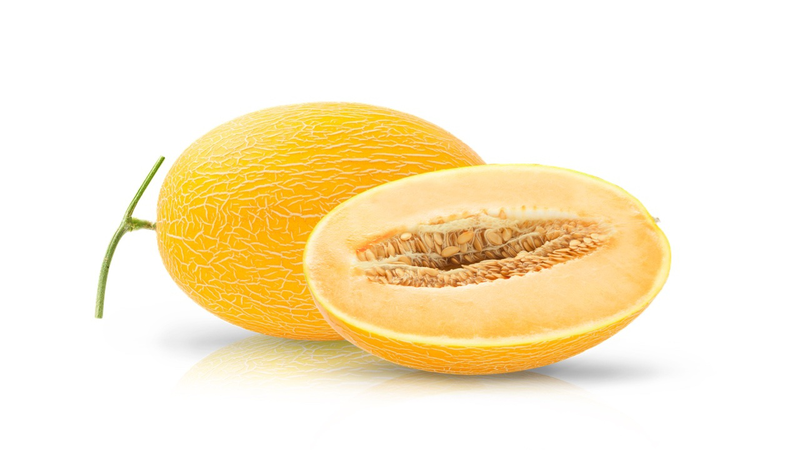Golden melon with abundant nutritional content, providing many important nutrients for the body to help improve eyesight, support weight loss and strengthen the immune system. This article will help you better understand the wonderful benefits that golden melon brings to our health.
In 177g of golden melon, it provides 64 calories, 92% of which come from carbohydrates, protein accounts for 5% and fat calories account for 3% of the remaining calories. Melon is a healthy food suitable for adding to our diet.
Characteristics and nutritional value of golden melon
Golden melon is a melon variety that has a history of cultivation for thousands of years, believed to have originated in the Middle East, West Asia or West Africa. Currently, this type of melon is widely grown around the world, including countries such as Australia, Asian countries, Africa as well as Central and South America. In addition, the golden melon is also cultivated in Europe, especially in countries such as Spain, Türkiye, Italy, Greece and Germany.
The golden melon is medium in size, usually 15 – 22cm long and round to oval in shape, weighing about 0.8 – 1.5kg. The rind is thin, bright yellow, hard and smooth with shallow veins on the surface. Notably, this type of melon often has a waxy layer and sometimes a little oil on the rind. When ripe, the texture of the melon becomes more chewy, creating a sound when tapping the surface with the thumb.

Golden melon originates from the Middle East.
The flesh inside is white to ivory, with light green spots, crisp and juicy. The seeds inside are oval, brown and covered with a smooth gel. In terms of flavor, the melon gives off a sweet aroma around the stem when ripe with a refreshing sweetness and a honeydew aftertaste. The golden melon is usually sweeter than the green melon. This fruit is in season from summer to early fall.
To understand the health benefits of golden melon, we need to look at the nutritional composition of this fruit. According to data from the USDA, a piece of golden melon weighing about 177 grams provides the following nutritional values:
- Calories: 64Kcal;
- Protein: 1g;
- Carbohydrates: 15g;
- Fiber: 1g;
- Sugar: 14g;
- Fat: 0.2g;
- Cholesterol: 0
- Calcium: 1% of daily needs;
- Iron: 2% of daily needs;
- Magnesium: 4% of daily requirement;
- Potassium: 4% of daily requirement;
- Vitamin C: 65% of daily requirement;
- Vitamin A: 6% of daily requirement.
The above information shows that golden melon is not only low in calories but also rich in vitamin C and essential minerals, helping to support overall health.

Golden melon is rich in vitamin C, good for the skin and immune system.
Health Benefits of Cantaloupe
Cantaloupe is a source of fiber, potassium, iron, manganese, folic acid, vitamin A, vitamin C and many other important nutrients. You will be surprised by the health benefits of this fruit:
- Improves eyesight: Cantaloupe contains vitamins A and C, which help improve eyesight. These vitamins support retinal health, making eyes brighter.
- Helps lose weight: With low saturated fat and low calories, cantaloupe is an ideal choice for weight loss. The fiber in melon helps you feel full for a long time, thereby reducing cravings and supporting weight control.
- Prevent heart disease: Vegetables containing potassium, such as cantaloupe, help reduce the risk of cardiovascular diseases, including heart attacks and strokes. In addition, this fruit also has anticoagulant properties due to the presence of adenosine, which helps maintain healthy blood circulation.
- Blood Pressure Control: Golden melon is rich in potassium, which plays an important role in controlling blood pressure and preventing hypertension.
- Boosts Immunity: With its rich vitamin C content, golden melon is an effective immune booster. It helps stimulate the production of white blood cells, which helps the body fight infections.
- Lowers Cholesterol: If you are looking to lower your cholesterol levels, add golden melon to your daily diet. This fruit is cholesterol-free, giving you complete peace of mind on this issue.
- Controls Diabetes: Studies have shown that regular consumption of cantaloupe can promote stable blood sugar levels and reduce the risk of diabetes.

Eating golden melon helps control diabetes and many other diseases
How to choose and preserve delicious golden melons
If you are looking for fresh and sweet golden melons, here are some useful tips to help you choose the best quality melon:
- Choose heavy melons: Heavier golden melons often contain more water, ensuring freshness and less dryness.
- Check for ripeness: A ripe golden melon will give off a pleasant aroma and have a shiny color. If the melon’s rind changes from light green to golden yellow, it is a sign that the fruit is ripe.
- Store in the refrigerator: To preserve golden melons for longer, you should keep them in the refrigerator, at a temperature of 7 – 10oC. Be careful not to leave them in the refrigerator for too long, as this can reduce the quality and flavor of the melon.

Melons should be stored in the refrigerator for longer use.
Golden melon is not only attractive with its natural sweetness but is also very popular for processing into many different delicious dishes. Here are some delicious dishes you can try from this fruit:
- Golden melon salad: Golden melon is chopped and combined with green vegetables, seeds and sauce, creating a fresh and nutritious salad, ideal for a snack or appetizer.
- Golden melon smoothie: Golden melon is pureed with condensed milk and sugar, bringing a delicious and nutritious smoothie, helping you quench your thirst and replenish your energy.
- Golden melon jam: Golden melon is cooked with sugar and water, waiting for the water to dry, creating a sweet jam, perfect to eat with cakes or tea.
Golden melon is really a great choice for those who want to add more nutrients to their daily diet. The diverse health benefits that this fruit brings not only help improve your physical health but also enhance your quality of life. Add golden melon to your menu to enjoy its delicious taste and the valuable nutritional values it provides.





